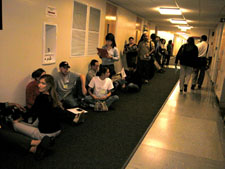Meeting the Requirements of HSPD-12
NIH Badging Effort Works to Accommodate Crowds |
| By Rich McManus |
| |
 |
 |
 |
| |
Queue forms for new badges in Bldg. 31. |
Last spring, NIH committed to an enormous task: provide new identification cards by the end of October to more than 5,500 employees, both new hires and old hands, plus a constant flow of contractors, fellows, summer students, tenants, volunteers,
special guests and others who need the cards to enter campus every day.
Complicating the challenge has been NIH’s need to comply with Homeland Security Presidential
Directive (HSPD) 12, which mandates—
for all federal workers, contractors and affiliates—background investigations, regardless
of how long you have worked for the federal government, fingerprinting and sometimes credit checks, depending on the sensitivity
of the individual’s job.
more…
|
|
|
|
NIH Treatment a Family Affair for Burlings |
| By Rich McManus |
|
On Friday, Sept. 14, the first anniversary of his initial visit to NIH, Patrick Burling of Newtown Square, Pa., was hale and hearty, so confident of his beloved Philadelphia Eagles’ chances of success in the following Monday evening’s clash with the Redskins that he presented the fiercely partisan hometown fans who staff the Clinical Center’s department of transfusion medicine (DTM) with genuine Eagles jerseys.
No one was happier to witness the good-natured trash-talking than Patrick’s mother Maureen, who for the past year has accompanied
her son on bimonthly trips to the Blood Bank, where both manage a common genetic disease—hereditary hemochromatosis (HH), or excess iron in the blood—with a simple therapy: phlebotomy, or blood donation.
more…
|
|
|
|

